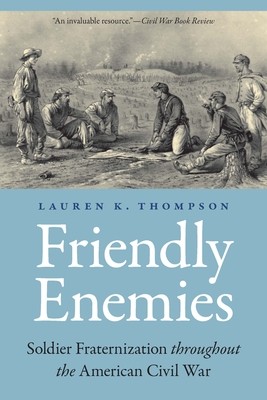
- We will send in 10–14 business days.
- Author: Lauren K Thompson
- Publisher: University of Nebraska Press
- Year: 2023
- Pages: 240
- ISBN-10: 1496233395
- ISBN-13: 9781496233394
- Format: 15.2 x 22.9 x 1.4 cm, minkšti viršeliai
- Language: English
- SAVE -10% with code: EXTRA
Reviews
Description
During the American Civil War, Union and Confederate soldiers commonly fraternized, despite strict prohibitions from the high command. When soldiers found themselves surrounded by privation, disease, and death, many risked their standing in the army, and ultimately their lives, for a warm cup of coffee or pinch of tobacco during a sleepless shift on picket duty, to receive a newspaper from a "Yank" or "Johnny," or to stop the relentless picket fire while in the trenches.
In Friendly Enemies Lauren K. Thompson analyzes the relations and fraternization of American soldiers on opposing sides of the battlefield and argues that these interactions represented common soldiers' efforts to fight the war on their own terms. Her study reveals that despite different commanders, terrain, and outcomes on the battlefield, a common thread emerges: soldiers constructed a space to lessen hostilities and make their daily lives more manageable.
Fraternization allowed men to escape their situation briefly and did not carry the stigma of cowardice. Because the fraternization was exclusively between white soldiers, it became the prototype for sectional reunion after the war--a model that avoided debates over causation, honored soldiers' shared sacrifice, and promoted white male supremacy. Friendly Enemies demonstrates how relations between opposing sides were an unprecedented yet highly significant consequence of mid-nineteenth-century civil warfare.
Lauren K. Thompson is an associate professor of history at McKendree University. Her work has been published in Civil War History and in the edited volume A Forgotten Front: Florida during the Civil War Era.
EXTRA 10 % discount with code: EXTRA
The promotion ends in 22d.15:56:24
The discount code is valid when purchasing from 10 €. Discounts do not stack.
- Author: Lauren K Thompson
- Publisher: University of Nebraska Press
- Year: 2023
- Pages: 240
- ISBN-10: 1496233395
- ISBN-13: 9781496233394
- Format: 15.2 x 22.9 x 1.4 cm, minkšti viršeliai
- Language: English English
During the American Civil War, Union and Confederate soldiers commonly fraternized, despite strict prohibitions from the high command. When soldiers found themselves surrounded by privation, disease, and death, many risked their standing in the army, and ultimately their lives, for a warm cup of coffee or pinch of tobacco during a sleepless shift on picket duty, to receive a newspaper from a "Yank" or "Johnny," or to stop the relentless picket fire while in the trenches.
In Friendly Enemies Lauren K. Thompson analyzes the relations and fraternization of American soldiers on opposing sides of the battlefield and argues that these interactions represented common soldiers' efforts to fight the war on their own terms. Her study reveals that despite different commanders, terrain, and outcomes on the battlefield, a common thread emerges: soldiers constructed a space to lessen hostilities and make their daily lives more manageable.
Fraternization allowed men to escape their situation briefly and did not carry the stigma of cowardice. Because the fraternization was exclusively between white soldiers, it became the prototype for sectional reunion after the war--a model that avoided debates over causation, honored soldiers' shared sacrifice, and promoted white male supremacy. Friendly Enemies demonstrates how relations between opposing sides were an unprecedented yet highly significant consequence of mid-nineteenth-century civil warfare.
Lauren K. Thompson is an associate professor of history at McKendree University. Her work has been published in Civil War History and in the edited volume A Forgotten Front: Florida during the Civil War Era.


Reviews